人教版(2019)必修第一册Unit3 Sports and fitness复习课件(28张ppt)
文档属性
| 名称 | 人教版(2019)必修第一册Unit3 Sports and fitness复习课件(28张ppt) | 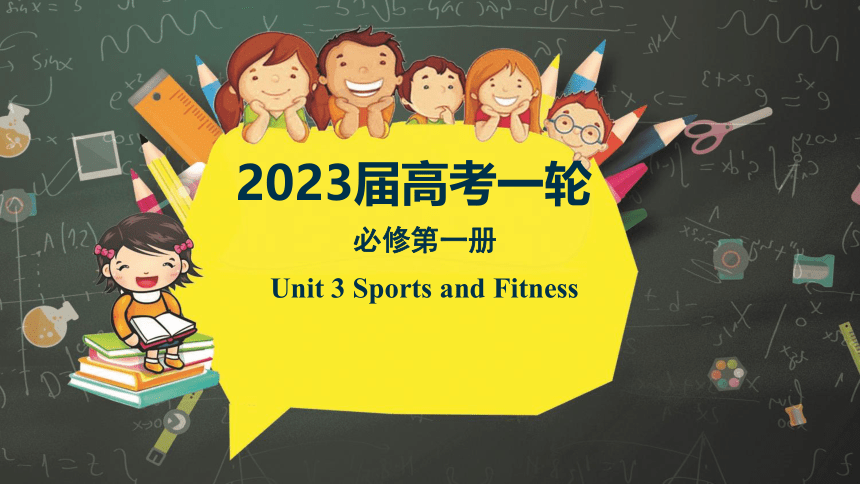 | |
| 格式 | zip | ||
| 文件大小 | 4.8MB | ||
| 资源类型 | 教案 | ||
| 版本资源 | 人教版(2019) | ||
| 科目 | 英语 | ||
| 更新时间 | 2022-11-20 18:51:55 | ||
图片预览


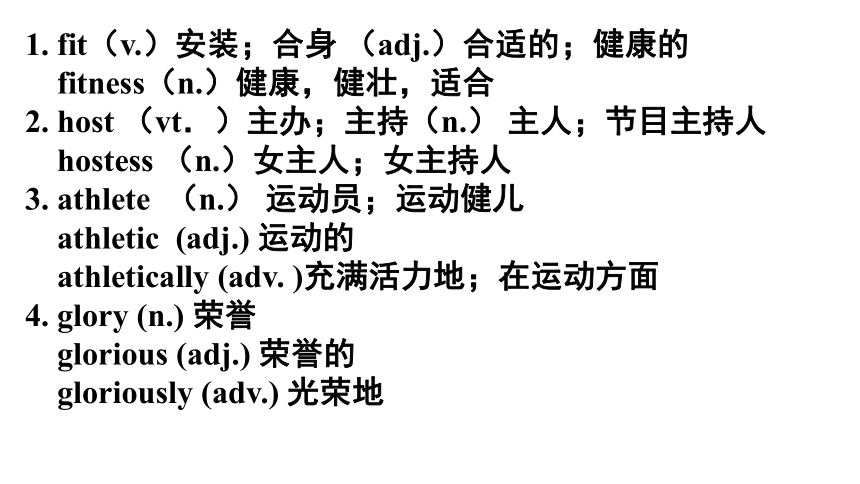
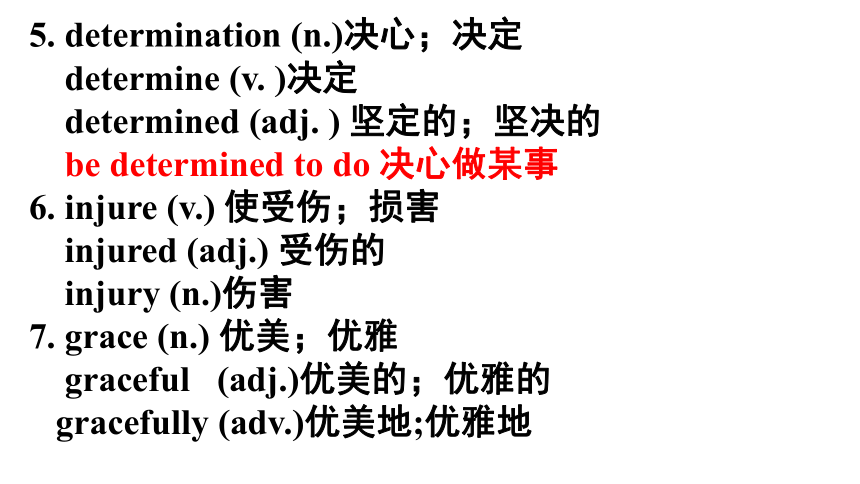
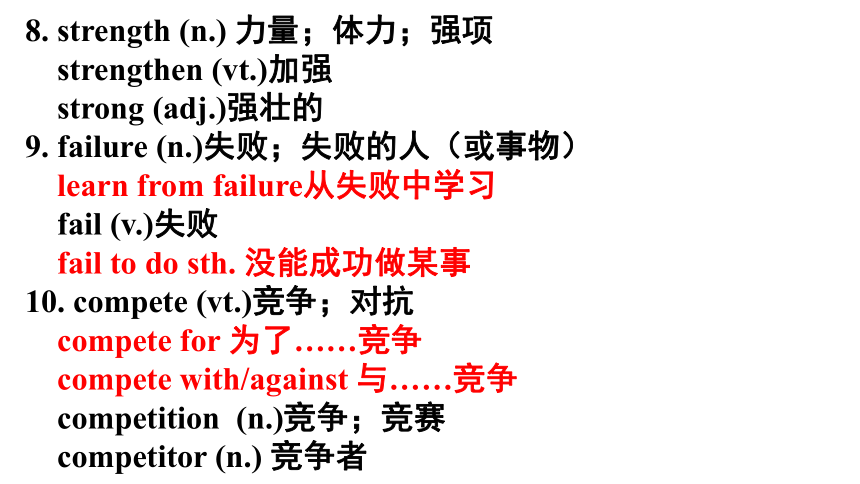
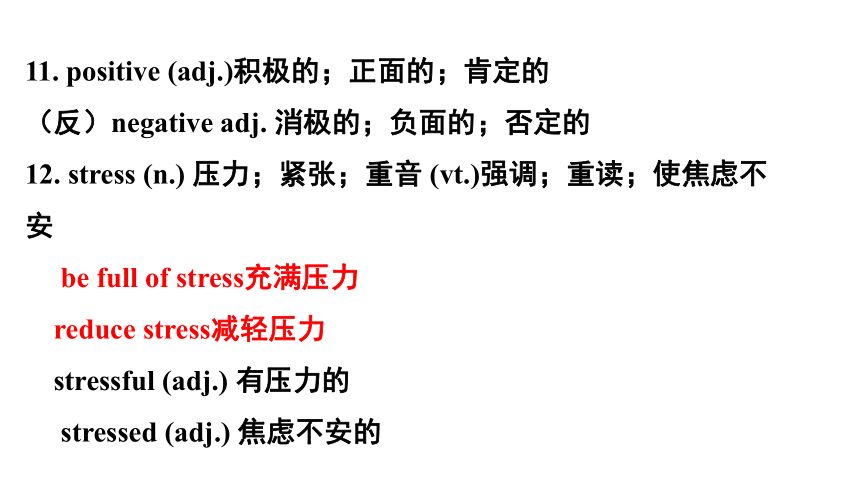

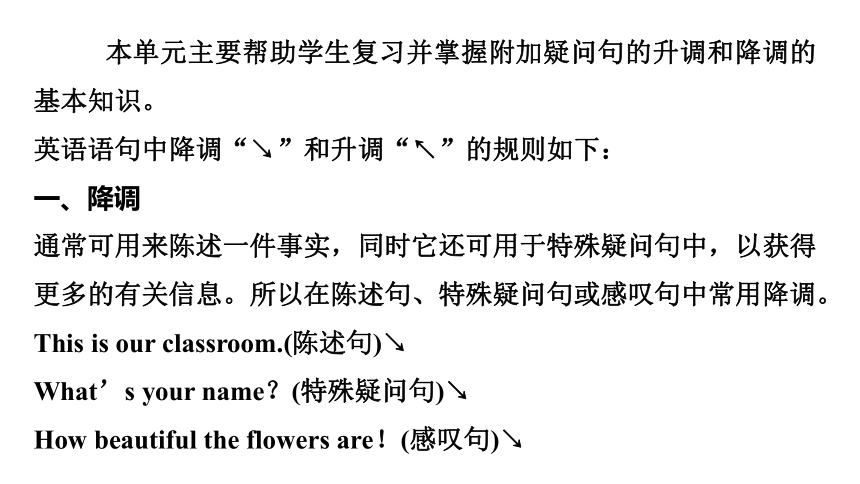

文档简介
(共28张PPT)
2023届高考一轮
必修第一册
Unit 3 Sports and Fitness
词汇
1. fit(v.)安装;合身 (adj.)合适的;健康的
fitness(n.)健康,健壮,适合
2. host (vt.)主办;主持(n.) 主人;节目主持人
hostess (n.)女主人;女主持人
3. athlete (n.) 运动员;运动健儿
athletic (adj.) 运动的
athletically (adv. )充满活力地;在运动方面
4. glory (n.) 荣誉
glorious (adj.) 荣誉的
gloriously (adv.) 光荣地
5. determination (n.)决心;决定
determine (v. )决定
determined (adj. ) 坚定的;坚决的
be determined to do 决心做某事
6. injure (v.) 使受伤;损害
injured (adj.) 受伤的
injury (n.)伤害
7. grace (n.) 优美;优雅
graceful (adj.)优美的;优雅的
gracefully (adv.)优美地;优雅地
8. strength (n.) 力量;体力;强项
strengthen (vt.)加强
strong (adj.)强壮的
9. failure (n.)失败;失败的人(或事物)
learn from failure从失败中学习
fail (v.)失败
fail to do sth. 没能成功做某事
pete (vt.)竞争;对抗
compete for 为了……竞争
compete with/against 与……竞争
competition (n.)竞争;竞赛
competitor (n.) 竞争者
11. positive (adj.)积极的;正面的;肯定的
(反)negative adj. 消极的;负面的;否定的
12. stress (n.) 压力;紧张;重音 (vt.)强调;重读;使焦虑不安
be full of stress充满压力
reduce stress减轻压力
stressful (adj.) 有压力的
stressed (adj.) 焦虑不安的
语音
本单元主要帮助学生复习并掌握附加疑问句的升调和降调的基本知识。
英语语句中降调“↘”和升调“↖”的规则如下:
一、降调
通常可用来陈述一件事实,同时它还可用于特殊疑问句中,以获得更多的有关信息。所以在陈述句、特殊疑问句或感叹句中常用降调。
This is our classroom.(陈述句)↘
What’s your name?(特殊疑问句)↘
How beautiful the flowers are!(感叹句)↘
二、升调
通常升调用于下列情况:
1.一般疑问句读升调:
Are you a doctor?↗
Would you like some soup?↗
2.陈述疑问句用升调:
You are a policeman?↗
3.未听清对方的话,要求对方重复一下用升调(以wh-开头的问句用升调常表示提问的人对所获得的回答没听清楚而要求对方再重复):
What Who When For what Pardon What is your name?↗
4.句子较长,中间划分意群停顿时通常都读升调。
If you like sports,you can be a coach,↗a sports reporter ↗or a PE teacher.↘
He is good at football,↗ping-pong ↗and basketball.↘
语法
附加疑问句是附加在陈述句后的简短问句,对陈述句所叙述的事实或观点提出疑问。
一、附加疑问句的组成
1.结构:
陈述句+反意疑问句(助动词/be动词/情态动词+陈述部分主语的相应代词)
2.规律:陈述句是肯定句,反意疑问句用否定;陈述句是否定句,反意疑问句用肯定。助动词和人称前后一致。如:
You are from Australia,aren’t you
He doesn’t live in Beijing,does he
二、否定附加疑问句的回答
当陈述部分为肯定式,附加疑问部分为否定式时,其回答一般不会造成困难,一般只需照情况回答即可:
—He wants to go,doesn’t he Does he want to go
—No,he doesn’t.
——他想去,不是吗?
——不,他不想去。
当陈述部分为否定式,附加疑问部分为肯定式时,要根据事实来回答,事实是肯定的用Yes;事实是否定的用No;此时的Yes译为“不”,No译为“是的”。
—You aren’t a student,are you Are you a student
—Yes,I am.
——你不是学生,是吗?
——不,我是。
不看反义疑问句部分,直接将陈述句改成疑问句,根据疑问句事实回答
三、附加疑问句的几种特殊情况
1.祈使句的反意疑问句用will you,但以let’s 开头的用shall we。
Look at the screen,will you
Let’s go hiking,shall we
2.陈述部分有little,few,never,hardly,seldom,no,nothing,nobody,no one,none,neither等表示否定意义的词时,其反意疑问句用肯定结构。
He seldom contacts his family,does he
3.反意疑问句的陈述部分含有由un-,im-,in-,dis-等否定意义的前缀构成的词语时,陈述部分要视为肯定含义,问句部分用否定形式。
Your little son is unhappy,isn’t he?(不能用is he?)
It is impossible to learn English well in that situation,isn’t it?(不能用is it?)
如果否定的部分是否定陈述句动词,反义疑问句用肯定形式;如果不是否定陈述句动词,反义疑问句用否定形式
4.陈述部分主语是this,that,these,those时,疑问部分主语用it,they。 These are credit cards,aren’t they
5.陈述部分是there be句型时,其反意疑问句中要用 there。
There was an old stadium in front of our school,wasn’t there
6.陈述部分用“used to+动词原形”时,问句部分用“didn’t+主语”或“usedn’t+主语”形式。
He used to live in the poor country,didn’t/usedn’t he
7.若陈述部分是一个主从复合句,问句一般要与主句一致。
He said the match was a failure,didn’t he
注意:当陈述部分是“I’m sure,I’m afraid,I think/suppose/
expect/imagine/believe等+宾语从句”结构时,以从句为准,而且要注意陈述部分的否定转移现象。
I don’t think he cheated in the match,did he
I think he didn’t cheat in the match
否定转移:将从句中的否定词移到主句中
8.感叹句后加反意疑问句时,其反意疑问句需用be的一般现在时态的否定形式。
What fine weather(it is),isn’t it
达标检测
Ⅰ.完成下列附加疑问句
1.He knows the athlete who has won four gold medals,
2.Taking notes carefully makes you learn better,
3.Alice,you wash the plates today,
4.You must have been there,
5.The economy of our country develops well,
6.He is not the man who gave us a lecture,
7.Don’t contact the guy addicted to drug,
8.It is the third time that he has been a champion,
doesn’t he
doesn’t it
will you
haven’t you
doesn’t it
is he
will you
isn’t it
Ⅱ.翻译句子
1.评论这件事意义不大,是吗?
_______________________________________________________
2.我相信下周五他会来派对的,对吗?
_______________________________________________________
3.他从没告诉我们他是怎么受伤的,是不是?
_______________________________________________________
There is little point in commenting on it,is there
I believe that he will come to the party next Friday,won’t he
He never told us how he was injured,did he
4.你认为我们不会跑完这次马拉松,是吗?
_______________________________________________________
5.她告诉我们她完成了任务,是吗?
_______________________________________________________
You don’t think we can finish the marathon,do you
She told us that she had finished the task,didn’t she
课文
While-reading:Text structure
Lang Ping
as a player:
as a coach:
as a person:
master
examples
difficulty:
brought honour and glory to her country
led the China women’s volleyball team to medals
loved by fans at home and abroad
the team fell apart
solution:
didn’t lose heart & be confident & worked together as a team
achievement:
world champion & Olympic gold
SUMMARY:
never lose heart; a strong determination; never give up;
full of confidence; never fear challenges; work as a team;
try our best; love our country
{
{
{
While-reading:Text structure
practice harder
never give up
SUMMARY:
Michael Jordan
master
example
“Air Jordan”:
graceful moves and jumps
unique mental strength
find a way to win
learn from his failures:
keep trying
share his success with others
help young people
learn from failure; never give up; practise hard;
keep trying; share success; help others
{
{
{
{
Ⅱ.The main idea of the passage is about ______________________
.
two master athletes who
set good examples for the people of the world
Language points : Important phrases (P38)
1
2
3
4
5
6
7
8
9
living legends
set good examples for
bring glory and honour to
fall apart
world champions
stand still
mental strength
find a way to win
lose a game
活着的传奇
为……树立好榜样
给……带来荣耀和荣誉
分解
世界冠军
站着不动
精神力量
找到赢的办法
输掉一场比赛
2023届高考一轮
必修第一册
Unit 3 Sports and Fitness
词汇
1. fit(v.)安装;合身 (adj.)合适的;健康的
fitness(n.)健康,健壮,适合
2. host (vt.)主办;主持(n.) 主人;节目主持人
hostess (n.)女主人;女主持人
3. athlete (n.) 运动员;运动健儿
athletic (adj.) 运动的
athletically (adv. )充满活力地;在运动方面
4. glory (n.) 荣誉
glorious (adj.) 荣誉的
gloriously (adv.) 光荣地
5. determination (n.)决心;决定
determine (v. )决定
determined (adj. ) 坚定的;坚决的
be determined to do 决心做某事
6. injure (v.) 使受伤;损害
injured (adj.) 受伤的
injury (n.)伤害
7. grace (n.) 优美;优雅
graceful (adj.)优美的;优雅的
gracefully (adv.)优美地;优雅地
8. strength (n.) 力量;体力;强项
strengthen (vt.)加强
strong (adj.)强壮的
9. failure (n.)失败;失败的人(或事物)
learn from failure从失败中学习
fail (v.)失败
fail to do sth. 没能成功做某事
pete (vt.)竞争;对抗
compete for 为了……竞争
compete with/against 与……竞争
competition (n.)竞争;竞赛
competitor (n.) 竞争者
11. positive (adj.)积极的;正面的;肯定的
(反)negative adj. 消极的;负面的;否定的
12. stress (n.) 压力;紧张;重音 (vt.)强调;重读;使焦虑不安
be full of stress充满压力
reduce stress减轻压力
stressful (adj.) 有压力的
stressed (adj.) 焦虑不安的
语音
本单元主要帮助学生复习并掌握附加疑问句的升调和降调的基本知识。
英语语句中降调“↘”和升调“↖”的规则如下:
一、降调
通常可用来陈述一件事实,同时它还可用于特殊疑问句中,以获得更多的有关信息。所以在陈述句、特殊疑问句或感叹句中常用降调。
This is our classroom.(陈述句)↘
What’s your name?(特殊疑问句)↘
How beautiful the flowers are!(感叹句)↘
二、升调
通常升调用于下列情况:
1.一般疑问句读升调:
Are you a doctor?↗
Would you like some soup?↗
2.陈述疑问句用升调:
You are a policeman?↗
3.未听清对方的话,要求对方重复一下用升调(以wh-开头的问句用升调常表示提问的人对所获得的回答没听清楚而要求对方再重复):
What Who When For what Pardon What is your name?↗
4.句子较长,中间划分意群停顿时通常都读升调。
If you like sports,you can be a coach,↗a sports reporter ↗or a PE teacher.↘
He is good at football,↗ping-pong ↗and basketball.↘
语法
附加疑问句是附加在陈述句后的简短问句,对陈述句所叙述的事实或观点提出疑问。
一、附加疑问句的组成
1.结构:
陈述句+反意疑问句(助动词/be动词/情态动词+陈述部分主语的相应代词)
2.规律:陈述句是肯定句,反意疑问句用否定;陈述句是否定句,反意疑问句用肯定。助动词和人称前后一致。如:
You are from Australia,aren’t you
He doesn’t live in Beijing,does he
二、否定附加疑问句的回答
当陈述部分为肯定式,附加疑问部分为否定式时,其回答一般不会造成困难,一般只需照情况回答即可:
—He wants to go,doesn’t he Does he want to go
—No,he doesn’t.
——他想去,不是吗?
——不,他不想去。
当陈述部分为否定式,附加疑问部分为肯定式时,要根据事实来回答,事实是肯定的用Yes;事实是否定的用No;此时的Yes译为“不”,No译为“是的”。
—You aren’t a student,are you Are you a student
—Yes,I am.
——你不是学生,是吗?
——不,我是。
不看反义疑问句部分,直接将陈述句改成疑问句,根据疑问句事实回答
三、附加疑问句的几种特殊情况
1.祈使句的反意疑问句用will you,但以let’s 开头的用shall we。
Look at the screen,will you
Let’s go hiking,shall we
2.陈述部分有little,few,never,hardly,seldom,no,nothing,nobody,no one,none,neither等表示否定意义的词时,其反意疑问句用肯定结构。
He seldom contacts his family,does he
3.反意疑问句的陈述部分含有由un-,im-,in-,dis-等否定意义的前缀构成的词语时,陈述部分要视为肯定含义,问句部分用否定形式。
Your little son is unhappy,isn’t he?(不能用is he?)
It is impossible to learn English well in that situation,isn’t it?(不能用is it?)
如果否定的部分是否定陈述句动词,反义疑问句用肯定形式;如果不是否定陈述句动词,反义疑问句用否定形式
4.陈述部分主语是this,that,these,those时,疑问部分主语用it,they。 These are credit cards,aren’t they
5.陈述部分是there be句型时,其反意疑问句中要用 there。
There was an old stadium in front of our school,wasn’t there
6.陈述部分用“used to+动词原形”时,问句部分用“didn’t+主语”或“usedn’t+主语”形式。
He used to live in the poor country,didn’t/usedn’t he
7.若陈述部分是一个主从复合句,问句一般要与主句一致。
He said the match was a failure,didn’t he
注意:当陈述部分是“I’m sure,I’m afraid,I think/suppose/
expect/imagine/believe等+宾语从句”结构时,以从句为准,而且要注意陈述部分的否定转移现象。
I don’t think he cheated in the match,did he
I think he didn’t cheat in the match
否定转移:将从句中的否定词移到主句中
8.感叹句后加反意疑问句时,其反意疑问句需用be的一般现在时态的否定形式。
What fine weather(it is),isn’t it
达标检测
Ⅰ.完成下列附加疑问句
1.He knows the athlete who has won four gold medals,
2.Taking notes carefully makes you learn better,
3.Alice,you wash the plates today,
4.You must have been there,
5.The economy of our country develops well,
6.He is not the man who gave us a lecture,
7.Don’t contact the guy addicted to drug,
8.It is the third time that he has been a champion,
doesn’t he
doesn’t it
will you
haven’t you
doesn’t it
is he
will you
isn’t it
Ⅱ.翻译句子
1.评论这件事意义不大,是吗?
_______________________________________________________
2.我相信下周五他会来派对的,对吗?
_______________________________________________________
3.他从没告诉我们他是怎么受伤的,是不是?
_______________________________________________________
There is little point in commenting on it,is there
I believe that he will come to the party next Friday,won’t he
He never told us how he was injured,did he
4.你认为我们不会跑完这次马拉松,是吗?
_______________________________________________________
5.她告诉我们她完成了任务,是吗?
_______________________________________________________
You don’t think we can finish the marathon,do you
She told us that she had finished the task,didn’t she
课文
While-reading:Text structure
Lang Ping
as a player:
as a coach:
as a person:
master
examples
difficulty:
brought honour and glory to her country
led the China women’s volleyball team to medals
loved by fans at home and abroad
the team fell apart
solution:
didn’t lose heart & be confident & worked together as a team
achievement:
world champion & Olympic gold
SUMMARY:
never lose heart; a strong determination; never give up;
full of confidence; never fear challenges; work as a team;
try our best; love our country
{
{
{
While-reading:Text structure
practice harder
never give up
SUMMARY:
Michael Jordan
master
example
“Air Jordan”:
graceful moves and jumps
unique mental strength
find a way to win
learn from his failures:
keep trying
share his success with others
help young people
learn from failure; never give up; practise hard;
keep trying; share success; help others
{
{
{
{
Ⅱ.The main idea of the passage is about ______________________
.
two master athletes who
set good examples for the people of the world
Language points : Important phrases (P38)
1
2
3
4
5
6
7
8
9
living legends
set good examples for
bring glory and honour to
fall apart
world champions
stand still
mental strength
find a way to win
lose a game
活着的传奇
为……树立好榜样
给……带来荣耀和荣誉
分解
世界冠军
站着不动
精神力量
找到赢的办法
输掉一场比赛
